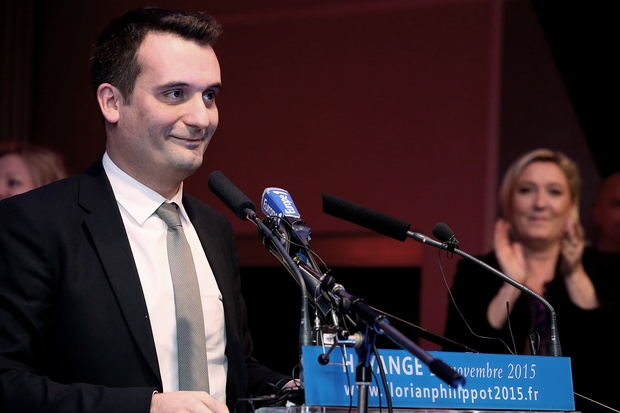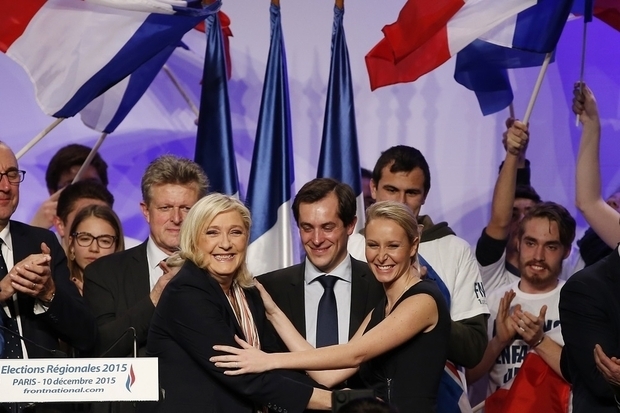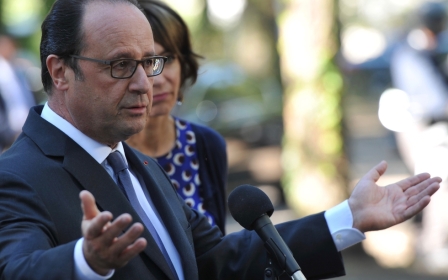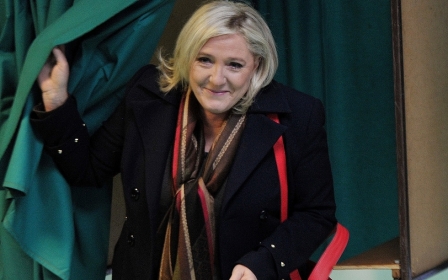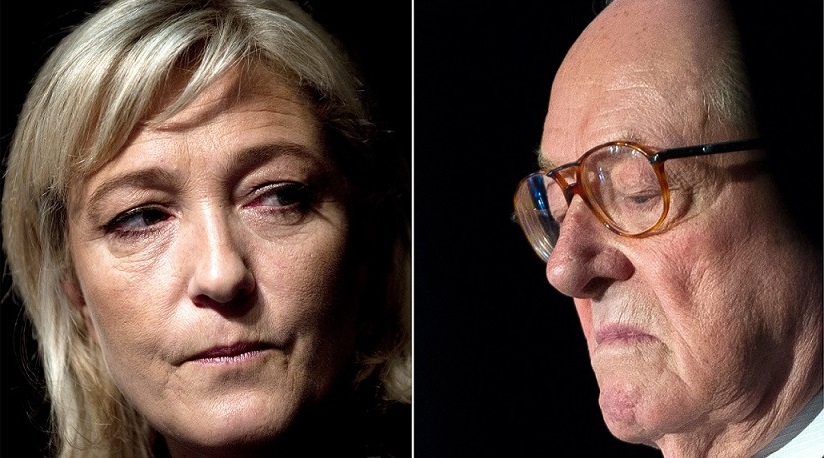
Different face, same party: The fake detoxification of France's far-right
Marine2017 is a simple but efficient slogan. Who needs a surname? In the beginning of September, Marine Le Pen made her political return in the northeast town of Brachay.
She made sure she would come across as a “free” woman. In her own words, she is not tied to “money” or to “the EU or Berlin”, and “not owing anything to anybody”. And certainly not to her father, the founder of the far-right National Front, Jean-Marie Le Pen.
The question still remains: what is the difference between the daughter’s NF and the father’s?
For a year now, the National Front (NF) presidential candidate has drifted away from the elder Le Pen, who had become a stumbling block for his daughter’s political climb after making controversial statements in public, including comments that gas chambers used to kill Jews during the Holocaust were “a detail of World War II”.
The cleaver came down in August 2015 when the NF executive bureau, and his daughter, banned him from the party.
Welcome to the political parricide and family feud of the House of Le Pen.
Detox - or sanitise?
Marine Le Pen’s current strategy is simple: be seen and heard everywhere, build on a “detoxification plan” – the NF’s strategy to completely sanitise its once extreme views - and bring it into the mainstream.
Every single media appearance is carefully considered: “Whenever she is on TV, she beats all viewing records. Media have anticipated this shift and have contributed to setting up her new image,” said Nonna Mayer, an expert on the far-right political movement from Sciences Po.
She has also surrounded herself with media savvy people, particularly social media experts, like Florian Philippot, NF’s number-two man who was the prime political guest on several French television stations in 2015.
Let it be said that Marine Le Pen’s version of the NF has nothing to do with her father’s. The skinheads are quietly being removed from party images. Racist comments are punished. And enough of the inexperienced representatives: media and PR training is now provided to all new elected representatives. The NF clearly wants to become a professional political party.
“We had a meeting at the NF headquarters about how to lead a town and how to avoid drama and provocation,” Cyril Nauth, Mantes-la-Ville (Yvelines) NF mayor, told Middle East Eye recently.
The fact the party is broadening its views shows even more clearly how deep the ideological split is between father and daughter. Indeed, the revamped NF no longer wants to be associated with the xenophobic flood of words that once was Jean-Marie Le Pen’s campaign slogan.
It aims instead to be a “democratic” party, Philippot told MEE in a recent interview.
This cleverly orchestrated split has attracted many. Christophe Versini, 27, a former member of Nicolas Sarkozy's centre-right Union for a Popular Movement (which rebranded in 2015 to become the Republicans), has just joined the NF ranks because he believes that only Marine Le Pen – not her father – can meet his expectations.
“The UMP has become way too pro-European, pro-Atlanticist. There has been more immigration under Nicolas Sarkozy’s presidency than Francois Hollande. It was not easy for me first to join the NF. But the current situation made me cross the bridge. I believe that only the NF can actually change things,” he said.
Cyril Nauth is another example of a revamped NF member. At 32 years old, he became mayor of his town after winning the municipal elections in 2014.
“I deemed Marine Le Pen capable of modernising the party in a good and efficient way, especially when it came to elections. Truthfully, campaigning for Marine Le Pen is now way easier than campaigning for Jean-Marie Le Pen,” he told MEE.
Attracting new members
Current developments in France are running in Marine Le Pen’s favour: unemployment is soaring and the threat of another attack hangs over France. As a result, there is no longer a strict or standard profile for NF members. They now come from various social and economic backgrounds.
But having inherited an “undermined party”, it has still taken work to draw them in, Mayer said.
In 1998, Bruno Megret, then the NF's number-two, severely weakened the party by directly opposing Jean-Marie Le Pen. At that time the NF had 42,000 members. Within two years, it had lost 30,000 of them.
“Marine Le Pen’s first goal was to rebuild the party. A real dynamism has been noted within the party, since in July 2015 it counted 51,000 members, among them more young people and more women,” Mayer said.
The shift, she said, has to do with women. When Jean-Marie Le Pen was leading the party, fewer women wanted to be involved with what was viewed as a violent extreme-right wing party.
“Women identify more because she’s a woman, a working woman, who calls herself an 'almost feminist', and who has modern takes about our society issues,” Mayer said.
Another shift happened in rural zones and small size towns, who have been voting NF more lately, feeling that the government has left them behind.
“They think all the money and funds are being unevenly distributed. They fear for their security. People who used to vote NF were people from the city. An IFOP survey shows that the fewer public services and shops there are in an area, the more people vote NF. Marine Le Pen exploits this part of France who feels ‘left behind’,” she added.
One further shift: between 2012 and 2016, the number of public servants who think they will vote for Marine Le Pen in 2017 has increased.
Running in place
But the question still remains: what is the difference between Marine Le Pen's NF and her father’s?
The NF has more or less always "changed” – and the ideological plasticity of a party constantly adapting to political requests and its electorate can cause headaches.
“The NF is constantly trying to differentiate itself,” said Nicolas Lebourg, an expert on the far-right, during a speech given at the Paris-based Jean Jaures Foundation.
When Marine Le Pen took FN’s lead, she followed a “national populist way of thinking which implied that the extreme right-wing would defend European values against a totalitarianism associated Islam. Her programme was in line with defending minorities such as women and gay people.
That was very much inspired by the Dutch neo-populist politician Geert Wilders.
“Since 2012, the NF has taken another direction: total sovereignty: sovereignty and authority against globalisation, presented as the orientalisation [of society] by Islam in terms of values and China in terms of economy. With terrorism, this thirst for more sovereignty and authority can be efficient.”
This sanitising strategy allows the NF to cast a wider net. The party is now the number one party among blue-collar workers, and claims that historical figures such as Jean Jaures, Loon Blum or even Karl Marx, would have voted NF.
And this is also how the party is wooing the left-wing electorate. But it has not forgotten the right-wing. Philippot, the mastermind behind this strategy, quotes politicians from the French-Algerian period, namely Charles De Gaulle, to appeal to an ever-nostalgic electoral base.
But doesn't evolution risk diluting the message? No chance, says Philippot: Not only has the NF kept score, he but its message “is getting more and more understandable and relatable”.
Between two poles
However, the NF's media campaign might not prove entirely successful. According to Lebourg's observations, “leading the NF onto the ‘normal road’ is ill-perceived by our members. So is Florian Philippot". Lebourg said that the architect of the "detoxification" of the party is perceived as a representative of a Parisian elite that is usually booed by the NF electorate.
Even worse, within the NF itself, the “We all support Marine” slogan has started to crack. Hence, two trends are now in motion.
Her Catholic, conservative niece also does not hesitate to claim that she’s “fed up of the values of the Republic”, which seemingly contradicts with the modern and republican image her aunt has patiently built up for the party.
And then there’s the camp of Philippot, who doesn’t position himself “in the left wing or in the right wing”, but instead pushes for liberal measures when it comes to social issues, and roots for protectionism when we talk about the economy.
Marine Le Pen is moving between those two poles, spinning dizzily from left to right – a method that seems to be working for voters.
“Those two tendencies complement each other and will lead us to victory for they allow us the possibility of a broad reach,” said Christophe Versini, an NF activist.
Still, when the elections come, the NF will have to get a mix of both. “Marine Le Pen will have to learn how to deal and manage the party’s contradictions,” said Lebourg.
More myth than substance
Meanwhile, despite the fact that she appears in stark contrast to her father, doesn’t fit in with extreme-right cliches, and has a dynamism that is “captivating and in contrast with the current dull and confused political landscape”, the pillars of the party under Marine Le Pen remain the same, said Mayer.
“The ‘new’ NF is more a myth, fuelled by the media who are fascinated by her,” she said.
When one looks closer at the NF’s programme, its members and its networks, there is a sense of continuity, she added.
“Marine Le Pen, like her father, knows how to walk along the edge,” Mayer said. “Remember what she said about the Muslim prayers that were taking place in the streets? She compared those events to the German occupation of France. As Jean-Marie Le Pen had once said: ‘Being too plain does not interest anybody’.”
Lebourg draws the same conclusions: “Radicalism remains the NF’s number one resource”. Fundamentally, he said, immigration, the electorate’s main concern, continues to be central to the party.
Social issues also continue to be reduced to ethnic ones. “Basically, the NF has two main doctrines: security and the hatred against migrants,” said demographer Herve Le Bras.
Is the "detoxification" strategy only an illusion? A fine rhetoric cleverly set up to talk about something that has not changed at all?
For the past 30 years, the NF has been picking up everyone who had endured the political and economic crisis: "Pieds-Noirs", blue-collars, small-businesses owners and modest civil servants who see the dissolution of the welfare state as the sign of their own downgrading. It has stood as the representative of "France against all".
During a recent interview, a resident of Mantes-la-Ville told journalist Mehdi Gherdane he voted for the NF after no one at the town hall had responded to his complained about noise at a nearby building site.
The NF still has the same arguments, only Marine Le Pen has just stopped using certain words and has replaced them with others: she does not talk about race, but culture; racial inequality has been replaced with protecting particularities; and rejecting "the other" is no longer used, but she talks about identity instead.
News ideas, same message
With the same arguments have come new ones loathed by the far-right fringe of its electorate: secularism, defending women’s rights even if this party has always been very old-fashioned, defending sexual minorities which is in direct opposition with the homophobic statements of the father.
But these new fights are no longer being carried out in the name of the nation, but in the name of the sovereignty, no longer in opposition with cosmopolitanism but against globalisation, not in the name of nationalism but in the name of patriotism, not for national preference but for national priority. And not against Islam but against "Islamism".
When it comes to Islamists, Marine Le Pen turns a very famous NF stigma around. The NF is not racist, but Islamists are. The NF is not racist, but some migrants are anti-French. The NF does not want to sound like the Marechal Petain anymore, but this party stands up against the “occupation”, the migrants invasion.
So perhaps a shift in words is happening, but the core message remains. Lebourg talks about an “organic vision” of the world where the nation is a living body that is being attacked from the outside as well as from the inside.
Nonna Mayer adds that the NF electorate “has a tendency, above the average, of rejecting minorities: Jewish people, Muslims, Roma, Black people and any foreigner for that matter. In their hierarchy, Jewish people are not the most hated race. Roms come first and then Muslims.”
So, let’s ask ourselves the question one more time: Is there really any change between a “regular NF” and “Marine Le Pen's version of the NF”? For Mayer, if there was any actual ‘detoxification’, it was aimed at making the party look less anti-Semitic.
However, this anti-Semitic trait that Marine Le Pen has been trying so hard to erase, even gaining sympathy from Roger Cukierman - chairman of the CRIF (Representative Council of French Jewish Institutions) - himself, is still very much characterised by its electorate.
"Every single survey shows that NF supporters are more anti-Semitic than the average, with disparities of 30 percent, between an average voter and a NF voter," Mayer said.
Maybe Marine Le Pen is careful not to cross the line when it comes to anti-Semitism, but is she careful about other themes?
Leaking through all strata
The rhetorical evolution of the NF has led to a complete reshaping of the French political landscape. For a long time, the NF had been a marginal “scarecrow” party with neo-Nazi activists. It is now a major player in the political scene. Or at least its favourite themes are: immigration, security, Islam.
This past summer, during Burkini-gate, the NF even had the luxury of being discreet on the matter, letting the Republicans and few Socialists fight over the garment that sparked such discord.
Even more surprisingly, in the heat of the debate, Marine Le Pen declared that Islam was compatible with the Republic, when Republicans and some Socialists were still seriously asking themselves the question. It’s truly a “through the looking glass moment” when traditional parties are using NF wording and where the NF is speaking like a traditional party.
What do we observe? On the right wing, Nicolas Sarkozy is trying out the same strategy he had in 2007, meaning he’s targeting NF supporters, using themes and words they are familiar with in order to gain their votes.
The “our ancestors are Gallic” speech is a perfect recent example. Herve Le Bras is straightforward: “Marine Le Pen has been mainly created by the right-wing parties".
On the left, Manuel Valls has predicted that the 2017 presidential campaign will coalesce around cultural and identity themes.
“The NF doesn’t need any more to campaign since other parties are doing so for it. It is here a sign of victory of the cultural hegemony,” Lebourg said.
If this hypothesis turns to be true - if the NF’s ideas are leaking through all strata of society - what are the consequences for French politics?
The Republicans and, to a lesser degree, the Socialists are trying to neutralise the NF by using the party’s themes. The real question is whether French voters are going for the original or the copies.
French voters have understood that “voting NF is protesting", said Lebourg. “It is a means of acting on reality. It is also a lobbying act as this is one of the only moments where the voter is listened to by other parties.”
But if all the other parties are carrying out a policy that is similar to the NF, what will the extreme-ring wing party will do to distance itself? The answer: take over other issues that have been neglected by the other parties, and focus on the particularities of the French electorate, which the other parties haven’t been able to do as they run after the NF, trying to catch up with it.
From campaigning to governance
The NF has plenty of ideas, namely thanks to the very well structured ‘Horaces’ group, a collection of high-ranking officials and businessmen, who offer the party proposals and analysis. So far, the NF has been able to create various groups for the environment, the underprivileged neighbourhoods, the education, and the entrepreneurs.
At the end of the day, being obsessed with immigration and foreigners does not ensure an efficient, nor a unifying policy
The NF has always been a political outcast which has never belonged to the left or to the right. This has been a strength, allowing it to be more flexible, fickle and adaptable. Everywhere and nowhere at the same time.
It has already started to shift from being a party with grievences to a party with aspirations and now will need to make the move from a party that has always been the first to criticise to one that must actually build something up, something that will be a true reality check for a party that has claimed to be in touch with the country and its people.
If the NF really wants power, it will have to ‘settle’ ideologically a bit more to say the least, which will force it to become ‘a more regular party, like the others’.
What about the fact that the party is still perceived as “different”, "a possible threat for democracy"? What about the fact that France is divided and these divisions are heightened by a tough economic situation and the recent terrorist attacks? Is the party ready?
If it wins the elections, there is not much evidence that NF will “ease” France, as its slogan asserts. At the end of the day, being obsessed with immigration and foreigners does not ensure an efficient, nor a unifying policy.
- Hasina Mechai is a French-Algerian journalist based in Paris. She has a bachelor's degree in law and international relations, focused on Africa and the Middle East. She focuses on issues of global governance, civil society and public opinion, the media and cultural soft power. She has worked for various French, African and Arab media, including Le Point, RFI, Africa magazine, Africa 24, Al Qarra and Respect magazine.
- Esther Thwadi-Yimbu is a French journalist based in Paris. She had a bachelor's degree in journalism and Anglophone and Francophone African literatures. She has worked with various media organisations including Le Parisien, France Soir, My-tivi, Africa 24, Al Qarra TV. She is focused on issues related to society, culture, environment and health.
The views expressed in this article belong to the author and do not necessarily reflect the editorial policy of Middle East Eye.
Photo: Marine Le Pen and her father Jean-Marie Le Pen (AFP)
This article was originally published on Middle East Eye's French website and translated by Nassima Demiche.
New MEE newsletter: Jerusalem Dispatch
Sign up to get the latest insights and analysis on Israel-Palestine, alongside Turkey Unpacked and other MEE newsletters
Middle East Eye delivers independent and unrivalled coverage and analysis of the Middle East, North Africa and beyond. To learn more about republishing this content and the associated fees, please fill out this form. More about MEE can be found here.


